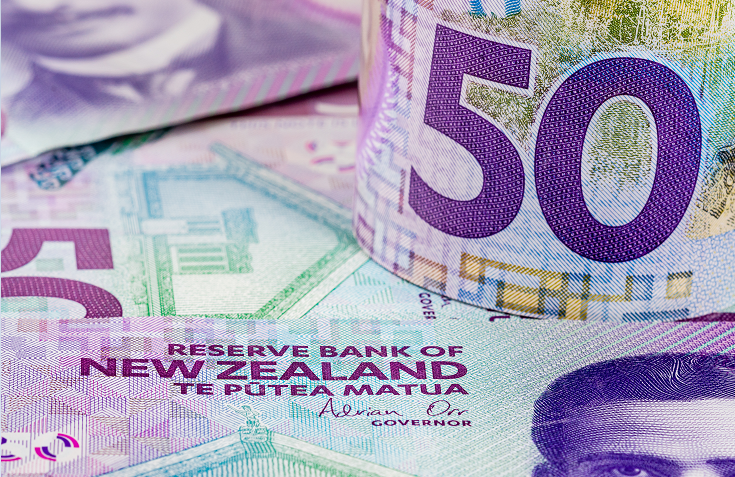IC Markets Asia Fundamental Forecast | 15 October 2024
What happened in the U.S. session?
During his speech on the economic outlook at Stanford University, Federal Reserve Governor Christopher Waller stated that “the central bank needs to proceed with more caution when cutting rates as he absorbs recent data showing a strong job market and hotter-than-expected inflation”, as evident in September’s BLS and ADP employment reports as well as last week’s CPI and PPI data. Governor Waller also mentioned that “the data is signaling that the economy may not be slowing as much as desired” but he stressed that the Fed does not wish to overreact to recent data points and called for reducing the Fed Funds rates gradually in 2025.
Following his speech, the dollar index (DXY) rose to a session high of 103.35 before retreating away from this level as his cautious tone dampened the spirits of the dollar bulls. Spot prices for gold were somewhat unmoved as it hovered around $2,650/oz. After making its intraday high of $2,685.79/oz at the end of September, this precious metal has been weighed down by the recent strength of the dollar.
What does it mean for the Asia Session?
After being closed in observance of Health-Sports Day, Japan’s financial markets will re-open today after a three-day weekend and we can expect normal trading activity to resume during the Asian hours.
The Dollar Index (DXY)
Key news events today
Empire State Manufacturing Index (12:30 pm GMT)
What can we expect from DXY today?
Manufacturing activity in the state of New York unexpectedly surged to 11.5 in September. Not only was this the first month of growth in ten months, but it also marked the highest level since April 2022 as key sub-indices such as new orders and shipments rebounded sharply. The estimate of 3.4 points to a second successive month of growth in October, albeit at a much slower pace. Should manufacturing activity exceed market expectations once more, it could fuel higher demand for the greenback later today.
Central Bank Notes:
- The Federal Funds Rate target range was reduced by 50 basis points to 4.75% to 5.00% on 18th September in an 11 to 1 vote with Governor Michelle Bowman dissenting, preferring to cut rates by a smaller amount.
- The Committee seeks to achieve maximum employment and inflation at the rate of 2% over the longer run and has gained greater confidence that inflation is moving sustainably toward 2%, and judges that the risks to achieving its employment and inflation goals are roughly in balance.
- The economic outlook is uncertain, and the Committee is attentive to the risks to both sides of its dual mandate.
- Recent indicators suggest that economic activity has continued to expand at a solid pace while job gains have slowed, and the unemployment rate has moved up but remains low.
- Inflation has made further progress toward the Committee’s 2% objective but remains somewhat elevated.
- In considering any adjustments to the target range for the federal funds rate, the Committee will carefully assess incoming data, the evolving outlook, and the balance of risks and does not expect it will be appropriate to reduce the target range until it has gained greater confidence that inflation is moving sustainably toward 2%.
- In assessing the appropriate stance of monetary policy, the Committee will continue to monitor the implications of incoming information for the economic outlook and would be prepared to adjust the stance of monetary policy as appropriate if risks emerge that could impede the attainment of the Committee’s goals.
- In addition, the Committee will continue reducing its holdings of Treasury securities and agency debt and agency mortgage-backed securities. Beginning in June, the Committee slowed the pace of decline of its securities holdings by reducing the monthly redemption cap on Treasury securities from $60 billion to $25 billion.
- The Committee will maintain the monthly redemption cap on agency debt and agency mortgage-backed securities at $35 billion and will reinvest any principal payments in excess of this cap into Treasury securities.
- Next meeting runs from 6 to 7 November 2024.
Next 24 Hours Bias
Weak Bearish
Gold (XAU)
Key news events today
Empire State Manufacturing Index (12:30 pm GMT)
What can we expect from Gold today?
Manufacturing activity in the state of New York unexpectedly surged to 11.5 in September. Not only was this the first month of growth in ten months, but it also marked the highest level since April 2022 as key sub-indices such as new orders and shipments rebounded sharply. The estimate of 3.4 points to a second successive month of growth in October, albeit at a much slower pace. Should manufacturing activity exceed market expectations once more, it could fuel higher demand for the greenback and potentially press down on gold prices later today.
Next 24 Hours Bias
Weak Bullish
The Australian Dollar (AUD)
Key news events today
No major news events.
What can we expect from AUD today?
The Aussie ranged approximately between 0.6705 and 0.6745 for most parts of Monday before settling around 0.6720 by the end of the U.S. session. This currency pair was edging higher towards 0.6730 as Asian markets came online – these are the support and resistance levels for today.
Support: 0.6690
Resistance: 0.6770
Central Bank Notes:
- The RBA kept the cash rate target unchanged at 4.35% on 24th September, marking the seventh consecutive pause.
- Inflation has fallen substantially since its peak in 2022, as higher interest rates have been working to bring aggregate demand and supply closer towards balance but it is still some way above the midpoint of the 2 to 3% target range.
- The trimmed-mean CPI was 3.9% YoY in the June quarter, broadly as forecast in the May Statement on Monetary Policy (SMP) while headline inflation declined in July as measured by the monthly CPI indicator.
- Headline inflation is expected to fall further temporarily but current forecasts do not see inflation returning sustainably to target until 2026.
- GDP data for the June quarter have confirmed that growth has been weak but growth in aggregate consumer demand, which includes spending by temporary residents such as students and tourists, remained more resilient.
- Broader indicators suggest that labour market conditions remain tight, despite some signs of gradual easing while wage pressures have eased somewhat.
- Data since then have reinforced the need to remain vigilant to upside risks to inflation and the Board is not ruling anything in or out while agreeing that policy will need to be sufficiently restrictive until the Board is confident that inflation is moving sustainably towards the target range.
- The Board will continue to rely upon the data and the evolving assessment of risks to guide its decisions and will pay close attention to developments in the global economy and financial markets, trends in domestic demand, and the outlook for inflation and the labour market.
- Next meeting is on 5 November 2024.
Next 24 Hours Bias
Weak Bullish
The Kiwi Dollar (NZD)
Key news events today
No major news events.
What can we expect from NZD today?
It was a relatively quiet session on Monday as the Kiwi traded within a narrow band from 0.6075 to 0.6100. This currency pair remains under overhead pressures and remained restricted under the 0.6100-mark at the beginning of the Asia session- these are the support and resistance levels for today.
Support: 0.6050
Resistance: 0.6125
Central Bank Notes:
- The Monetary Policy Committee agreed to reduce the OCR by 50 basis points, bringing it down to 4.75% in October as inflation converges to target.
- The Committee assesses that annual consumer price inflation is within its 1 to 3% inflation target range and converging on the 2% midpoint.
- Economic activity in New Zealand is subdued, in part due to restrictive monetary policy while business investment and consumer spending have been weak, and employment conditions continue to soften.
- The economy is now in a position of excess capacity, encouraging price- and wage-setting to adjust to a low-inflation economy; lower import prices have assisted the disinflation.
- High-frequency indicators point to continued subdued growth in the near term, mostly due to weak consumer spending and business investment while labour market conditions are expected to ease further, with filled jobs and advertised vacancy rates continuing to decline.
- The Committee confirmed that future changes to the OCR would depend on its evolving assessment of the economy.
- Next meeting is on 27 November 2024.
Next 24 Hours Bias
Weak Bearish
The Japanese Yen (JPY)
Key news events today
No major news events.
What can we expect from JPY today?
Waning demand for the yen in October has driven USD/JPY up to the 150-level. This currency pair came within a whisker of breaching this level before pulling back at the end of the U.S. session. The downward retracement picked up pace as Asian markets came online with USD/JPY dipping under 149.50 – these are the support and resistance levels for today.
Support: 147.20
Resistance: 150.90
Central Bank Notes:
- The Policy Board of the Bank of Japan decided, by a unanimous vote, to set the following guideline for money market operations for the intermeeting period:
- The Bank will encourage the uncollateralized overnight call rate to remain at around 0.25%
- The Bank will embark on a plan to reduce the amount of its monthly outright purchases of JGBs so that it will be about 3 trillion yen in January-March 2026; the amount will be cut down by about 400 billion yen each calendar quarter in principle.
- The year-on-year rate of increase in the consumer price index (CPI, all items less fresh food) has been in the range of 2.5 to 3.0% recently, as services prices have continued to rise moderately, reflecting factors such as wage increases, although the effects of a passthrough to consumer prices of cost increases led by the past rise in import prices have waned.
- Meanwhile, underlying CPI inflation is expected to increase gradually, since it is projected that the output gap will improve and that medium- to long-term inflation expectations will rise with a virtuous cycle between wages and prices continuing to intensify.
- In the second half of the projection period of the July 2024 Outlook for Economic Activity and Prices, it is likely to be at a level that is generally consistent with the price stability target.
- Japan’s economy has recovered moderately, although some weakness has been seen in part, but it is likely to keep growing at a pace above its potential growth rate, with overseas economies continuing to grow moderately and as a virtuous cycle from income to spending gradually intensifies against the background of factors such as accommodative financial conditions.
- Next meeting is on 31 October 2024.
Next 24 Hours Bias
Weak Bearish
The Euro (EUR)
Key news events today
ZEW Economic Sentiment (9:00 am GMT)
What can we expect from EUR today?
The ZEW Economic Sentiment has deteriorated drastically since July as it plunged to 9.3 in September to mark an 11-month low. Ongoing uncertainty about the economic outlook and the direction of monetary policies have dragged this index significantly lower. However, October’s estimate of 16.9 points to a rebound in sentiment and would mark the first increase in four months. Should the ZEW exceed market expectations, it could provide a much-needed lift for the Euro during the European trading hours.
Central Bank Notes:
- The Governing Council today decided to reduce the three key ECB interest rates on 12th September, after holding rates steady in July.
- Accordingly, the interest rate on the main refinancing operations and the interest rates on the marginal lending facility and the deposit facility will be decreased to 3.65%, 3.90% and 3.50% respectively.
- Recent inflation data have come in broadly as expected, and the latest ECB staff projections see headline inflation averaging 2.5% in 2024, 2.2% in 2025 and 1.9% in 2026.
- For core inflation, the projections for 2024 and 2025 have been revised up slightly, as services inflation has been higher than expected. At the same time, staff continue to expect a rapid decline in core inflation, from 2.9% this year to 2.3% in 2025 and 2.0% in 2026.
- ECB staff projections forecast that the economy will grow by 0.8% in 2024, rising to 1.3% in 2025 and 1.5% in 2026 which is a slight downward revision compared with the June projections, mainly owing to a weaker contribution from domestic demand over the next few quarters.
- The Eurosystem no longer reinvests all of the principal payments from maturing securities purchased under the pandemic emergency purchase programme (PEPP), reducing the PEPP portfolio by €7.5 billion per month on average and the Governing Council intends to discontinue reinvestments under the PEPP at the end of 2024.
- The Council is determined to ensure that inflation returns to its 2% medium-term target in a timely manner and will keep policy rates sufficiently restrictive for as long as necessary to achieve this aim and is not pre-committing to a particular rate path.
- Next meeting is on 17 October 2024.
Next 24 Hours Bias
Weak Bearish
The Swiss Franc (CHF)
Key news events today
No major news events.
What can we expect from CHF today?
The franc weakened overnight to lift USD/CHF towards 0.8640 before running out of steam by the end of the U.S. session. This currency pair was falling towards 0.8600 as Asian markets came online and is likely to remain under pressure today – these are the support and resistance levels for today.
Support: 0.8560
Resistance: 0.8640
Central Bank Notes:
- The SNB eased monetary policy by lowering its key policy rate by 25 basis points for the third consecutive meeting, going from 1.25% to 1.00% in September.
- Inflationary pressure has again decreased significantly compared to the previous quarter, reflecting the appreciation of the Swiss franc over the last three months.
- Inflation in the period since the last monetary policy assessment was lower than expected, standing at 1.1% in August compared to 1.4% in May.
- The new conditional inflation forecast is significantly lower than that of June: 1.2% for 2024, 0.6% for 2025 and 0.7% for 2026, based on the assumption that the SNB policy rate is 1.0% over the entire forecast horizon.
- Swiss GDP growth was solid in the second quarter of 2024 as momentum in the chemicals/pharmaceuticals industry was particularly strong.
- However, growth is likely to remain rather modest in the coming quarters due to the recent appreciation of the Swiss franc and the moderate development of the global economy.
- The SNB anticipates GDP growth of around 1% this year while currently expecting growth of around 1.5% for 2025.
- Further cuts in the SNB policy rate may become necessary in the coming quarters to ensure price stability over the medium term.
- Next meeting is on 12 December 2024.
Next 24 Hours Bias
Weak Bearish
The Pound (GBP)
Key news events today
Labour Market Overview (6:00 am GMT)
What can we expect from GBP today?
The U.K. will release its report on the labour market where the claimant count change is expected to remain steady with a reading of 20.2K in September, edging slightly lower from 23.7K in August, while the unemployment rate is anticipated to stay on hold at 4.1%. Should the report highlight a robust labour market, it could function as a potential bullish catalyst for the Cable before the start of the European trading hours.
Central Bank Notes:
- The Bank of England’s Monetary Policy Committee (MPC) voted by a majority of 8 to 1 to maintain Bank Rate at 5.0% while one member preferred to reduce Bank Rate by 25 basis points to 4.75%, on19th September 2024.
- The MPC also voted unanimously to reduce the stock of UK government bond purchases held for monetary policy purposes, and financed by the issuance of central bank reserves, by £100B over the next 12 months to a total of £558B.
- Twelve-month CPI inflation had been 2.2% in August and July, slightly lower than August Report expectations. Consumer core goods and food price inflation had remained subdued as the cost pressures from previous global shocks had unwound further, and producer price levels had been broadly flat while energy prices had continued to drag on CPI inflation.
- Services price inflation had increased to 5.6% in August compared to 5.2% in July and 5.7% in June. This was slightly lower in August than had been expected at the time of the August Report. There had been volatility in a number of services sub-components in the July and August outturns, including accommodation and catering prices and airfares.
- GDP had increased by 0.6% in 2024 Q2, 0.1 percentage points lower than had been expected in the August Monetary Policy Report. That had followed 0.7% growth in Q1, but Bank staff judged that the underlying pace of growth had been somewhat weaker during the first half of the year.
- Headline GDP growth was expected to return to its underlying pace of around 0.3% per quarter in the second half of the year. Based on a broad set of indicators, the MPC judged that the labour market continued to loosen but that it remained tight by historical standards.
- Monetary policy decisions have been guided by the need to squeeze persistent inflationary pressures out of the system so as to return CPI inflation to the 2% target both in a timely manner and on a lasting basis; policy has been acting to ensure that inflation expectations remain well anchored.
- In the absence of material developments, a gradual approach to removing policy restraint remains appropriate while monetary policy will need to continue to remain restrictive for sufficiently long until the risks to inflation returning sustainably to the 2% target in the medium term have dissipated further.
- The Committee continues to monitor closely the risks of inflation persistence and will decide the appropriate degree of monetary policy restrictiveness at each meeting.
- Next meeting is on 7 November 2024.
Next 24 Hours Bias
Weak Bullish
The Canadian Dollar (CAD)
Key news events today
CPI (12:30 pm GMT)
What can we expect from CAD today?
Inflation in Canada has moderated significantly lower over the past eight months as measured by the various CPI metrics such as median-, trimmed- and common-CPI. However, September’s estimate points to a slight acceleration in common-CPI while the other metrics are expected to remain steady. Should price pressures surprise to the upside, it could trigger higher demand for the Loonie and restrain the recent rise in USD/CAD later today.
Central Bank Notes:
- The Bank of Canada reduced its target for the overnight rate by 25 basis points for the third consecutive meeting to 4.25% while continuing its policy of balance sheet normalization on 4th September.
- Canada’s economy grew 2.1% in the second quarter of 2024, led by government spending and business investment.
- This second quarter GDP growth was slightly stronger than forecast in July, but preliminary indicators suggest that economic activity was soft through June and July.
- As expected, inflation slowed further to 2.5% in July. The Bank’s preferred measures of core inflation averaged around 2.5% and the share of components of the consumer price index growing above 3% is roughly at its historical norm.
- High shelter price inflation is still the biggest contributor to total inflation but is starting to slow while inflation also remains elevated in some other services.
- The labour market continues to slow, with little change in employment in recent months. Wage growth, however, remains elevated relative to productivity.
- The Governing Council is carefully assessing these opposing forces on inflation and monetary policy decisions will be guided by incoming information and our assessment of their implications for the inflation outlook.
- The Bank remains resolute in its commitment to restoring price stability for Canadians.
- Next meeting is on 23 October 2024.
Next 24 Hours Bias
Medium Bullish
Oil
Key news events today
No major news events.
What can we expect from Oil today?
Crude prices fell sharply on Monday as OPEC lowered its outlook for global oil demand growth in 2024 and 2025 while a media report showed Israel was willing to target only military-related facilities and not nuclear or oil installations. WTI oil plunged nearly 3.5% to fall under $72 and is expected to remain under intense overhead pressures as the day progresses.
Next 24 Hours Bias
Weak Bearish





